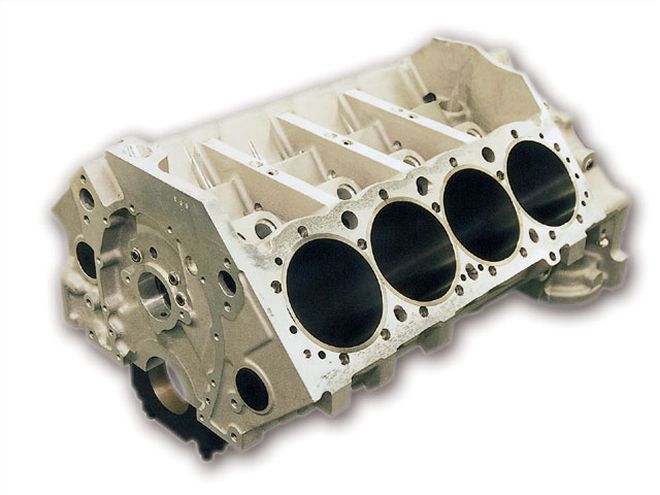

In hot rodding, lighter is better, and World Products' new Motown Lite aluminum replacement Chevy small-block is a good example why. It weighs about half as much as its iron sibling, so the engine has to do less work to make a car faster. It also helps the weight distribution, making the vehicle more nimble. And it looks cool.
"With this block and aluminum heads, you get an engine that weighs only about 435 pounds," says World's Bill Mitchell. "That won't even compress the front springs on some cars." It's also a bit less than the advertised shipping weight of a modern Gen III LS6 crate engine.
Like the iron version, the alloy Motown Lite is strategically beefy. The 357-T6-cast bare block (with main caps and cylinder liners installed) weighs just 100 pounds-a comparable iron Motown block weighs 195 pounds, and stock Chevy small-blocks are 150-170 pounds. A Gen III aluminum case is just over 100 pounds with sleeves.
Besides its natural aluminum color, the most obvious deviations from the World Products' iron small-block-or for that matter, GM's own small-block Chevy-are the horizontal strengthening ribs along the cylinder banks. "Certainly they add strength," says Mitchell, but let's be honest: he added them to the casting because ribbed aluminum looks neat.
The extra meat in the block's casting is mostly on the inside, so all the Chevy small-block accessories, from intake manifolds to fuel pumps, bolt up as with a stock engine. The extra metal allows World Products to slip in some extra-wide cylinder liners and stir up Mitchell's large-displacement recipe for Richter-scale-registering torque. A 427ci displacement is the maximum with a 4.000-inch crank because the overbore limit is 4.125, while the Motown iron small-block can be bored 4.250 to yield a 454ci displacement.
Another of the aluminum block's unique features is a series of O-rings at the bottom of the cylinders. They help hold the liners in place and prevent oil from squeezing between the liners and the block-the bane of many aluminum engines. "When it gets up there, the oil acts like an insulator and prevents the aluminum from transferring heat," says Mitchell. "It also helps dislodge the liners."
The Price Is Right?
It's certainly close. World Products says the list price for the aluminum block is $3,295 if equipped with nodular-iron main caps and $3,495 with splayed billet caps; both 350- and 400-style mains are available. That's awfully reasonable for an all-new casting, but it's even cheaper when ordered as an upgrade to a Motown crate engine, where it adds $2,000 to the bottom line. Mitchell's goal is to have the most affordable aluminum block on the market, and compared to some exotic race castings, World's aluminum block costs roughly half. And these were designed as much for street performance as competition. "We learned a lot in the manufacture of other parts that really helped make this affordable," says Mitchell. "We wouldn't have done it if we were building just 100 or so each year for Sprint Cars."
Despite the aluminum block's obvious performance enablers, Mitchell says the "wow" factor is just as important to hot rodders and we don't disagree. You wouldn't want to paint this block-just let the natural aluminum color and external ribbing do the talking under the hood of a Pro-Touring '69 Camaro or street rod. "I think it'll look awesome polished," says Mitchell.
The aluminum block adds to Mitchell's burgeoning list of new products. His World Products employees are already busy trying to meet the demand for hundreds of Motown small-blocks, but a new all-aluminum 427ci, 530hp crate engine will soon be among their chores. That's all on top of the longstanding line of Merlin big-block engines and parts-not bad for a former racer who was spinning wrenches on the original Baldwin-Motion cars more than 30 years ago.
World Products Ford Blocks Coming Soon
Catching Bill Mitchell messing around with Ford stuff is kind of like walking into a synagogue and finding the Pope. But, as you're reading this, Mitchell's World Products company should be popping out freshly cast Windsor-style engine blocks.
Called Windsor-R, it is designed with more metal in strategic areas, which should help builders of 500-plus-horsepower engines reduce the chances of literally splitting their Windsor in two-an all-too-common and catastrophic malady that plagues Mustang racers who rely on generous portions of juice or boost.
An engine out of a Roush cup car was sliced like a loaf of bread for research, and Roush engine builders were consulted about improving the block's design.
"We came up with a perfect-world Ford block and designed the Windsor-R accordingly," says Mitchell.
An inch of material was added to the front and rear bulkheads, and the bottom end is held together with four-bolt-main caps (splayed middle caps), so goodbye stud girdle. Also, two extra head bolts have been added to each cylinder, answering the prayers of gasket-blowing boost junkies. The oiling system was redesigned from scratch.
The block will take a 4.200-inch bore and a 4.250-inch stroke, and will be offered with four deck heights ranging from 8.200 inches (short 302) to 9.500 inches (tall 351). With World Products already producing Windsor-R heads for the Windsor, a Motown-style crate engine package is all but a certainty.